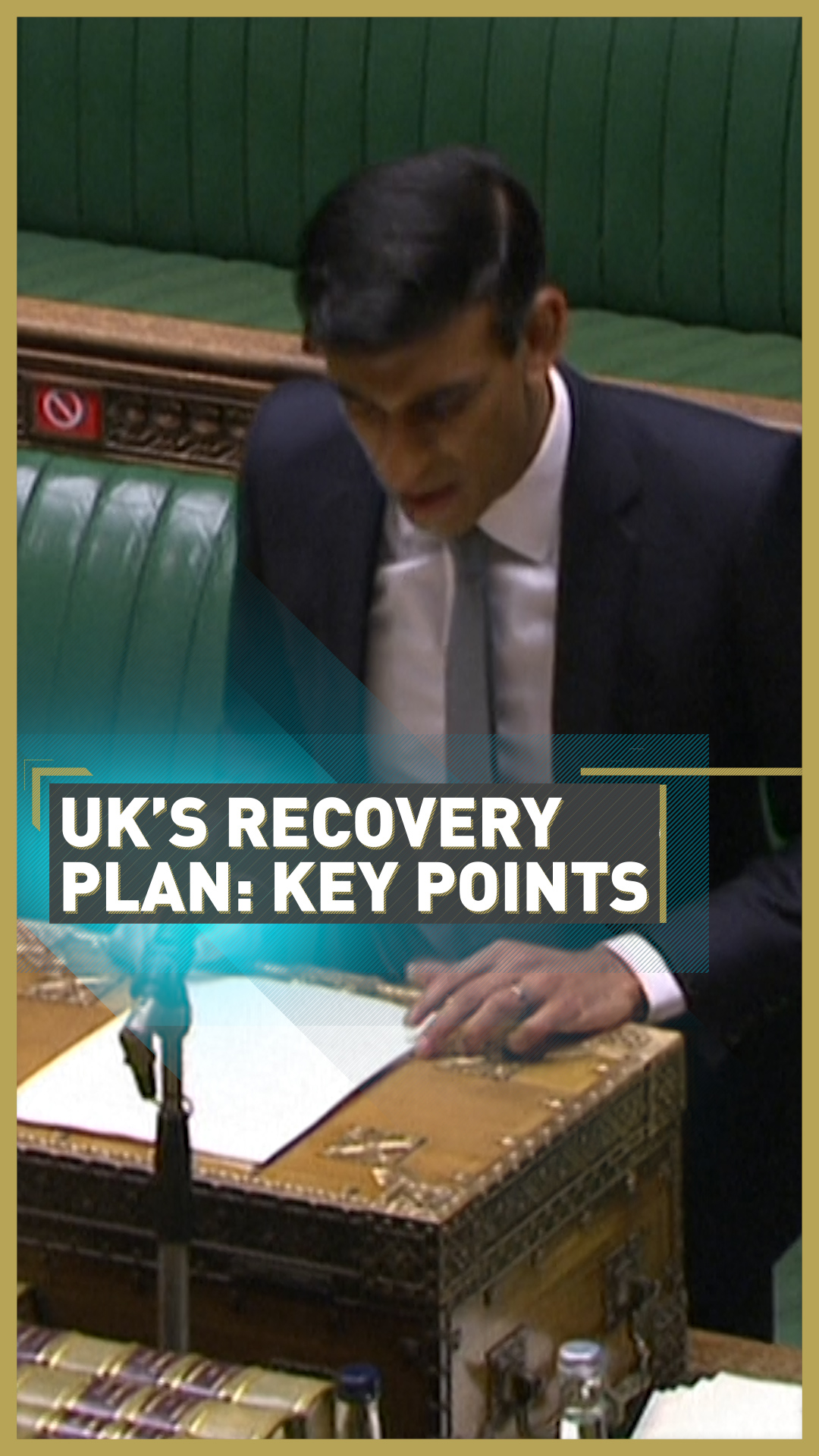01:53

UK finance minister Rishi Sunak warned of economic hardship ahead as he announced the government's plans to protect jobs and mitigate the impact of the coronavirus.
His announcement on Wednesday comes as the UK economy is expected to contract by up to 10 percent in 2020, and fears of sharp rises in unemployment loom when the state's furlough scheme – currently supporting more than nine million workers – ends in October.
Sunak, like many of Europe's financial ministers, is both attempting to pull back on the emergency measures brought in when the country went into lockdown, while attempting to protect the already damaged economy and driving jobs growth.
The UK, unlike the U.S., has been spared soaring unemployment figures, largely thanks to Sunak's furlough scheme, through which the state has been paying the majority of the salaries of workers who were not fired. Some 1.1 million employers have taken advantage of the program to furlough 9.4 million people at a cost to the government of 27.4 billion pounds ($35 billion).
The finance minister confirmed the scheme will finish in October, stating: "Leaving the furlough scheme open forever gives people false hope that it will always be possible to return to the jobs they had before.
"The longer people are on furlough, the more likely it is their skills could fade, and they will find it harder to get new opportunities," he added.
Sunak said he will announce a third stage of his economic recovery strategy in the customary Autumn Budget announcement.
Speaking in parliament, Sunak said: "Our plan has a clear goal: to protect, support and create jobs. It will give businesses the confidence to retain and hire. To create jobs in every part of our country. To give young people a better start. To give people everywhere the opportunity of a fresh start."
The plan includes:
- A discount worth up to £10 ($12.55) per person for eating out in August.
- A "job retention bonus" for firms that re-employ furloughed workers, worth up to 9 billion pounds ($11.3 billion).
- Companies will receive £1,000 ($1,255) when they take employees off the furlough scheme.
- A £2 billion ($2.55bn) "kick-starter" job-creation scheme, aimed at subsiding young people's labor. The state will pay the minimum wage for up to 300,000 people aged 16-24 for up to six months.
- Stamp duty abolished on homes worth up to £500,000 ($629,000) until next March.
- A VAT cut on tourism and hospitality to 5 percent until January 2021
- Investment of £3 billion ($3.76bn) in green schemes, that aims to help the UK "build back greener."

British Chancellor of the Exchequer Rishi Sunak has been one of Britain's most popular politicians over the lockdown period. /AP Photo/Matt Dunham
British Chancellor of the Exchequer Rishi Sunak has been one of Britain's most popular politicians over the lockdown period. /AP Photo/Matt Dunham
Britain reacts
Anneliese Dodds, of the opposition Labour Party, criticized the announcements, saying Sunak has "put off" many of the big economic decisions until the fall.
"It should have been the day when the millions of British people worried about their jobs and future prospects had a load taken off of their shoulders. It should have been the day when we got the UK economy firing again," she told parliament.
The general secretary of the umbrella Trades Union Congress, Frances O'Grady, was similarly critical, posting on Twitter: "There are 3.7m key workers on less than £10 an hour. They kept us going in this crisis. The chancellor should have given them a pay rise, not a dining out discount for the well-off."
Although the news was welcomed by the sectors of the UK economy directly addressed in the plan. UK Hospitality, which represents the sector, said the measures provide many firms "much-needed help to get going again in earnest."
Gerard Lyons, a former adviser to UK Prime Minister Boris Johnson during his time as London Mayor, complimented Sunak's proposal as "radical," telling CGTN Europe that the measures would lead to a "very strong recovery."
Unprecedented in peacetime
The investment could push the UK's budget deficit past the 300 billion pound ($376 billion) mark, according to the Institute for Fiscal Studies.
The figure, which is unprecedented in British peacetime history, is a far cry from previous Conservative Party agendas, with the government of David Cameron, in 2010, announcing its aim to eliminate the deficit by 2015, despite being in the aftermath of the 2008 Global Financial Crisis. Years of austerity measures followed, a policy Johnson has promised not to pursue.
Check out The Pandemic Playbook, CGTN Europe's major investigation into the lessons learned from COVID-19.
Video editing: Terry Wilson